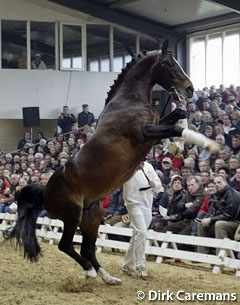
As an alternative to the obviously irreversible procedure of stallion castration, Equine medical company Pfizer produced the product Equity of which they officially say it is "not a vaccine or a chemical castration method". The product is registered for use on mares, but many high performance international riders are welcoming the 'side-effect' of the product to reduce testosterone induced behaviour of their dressage stallions.
"If veterinarians are prescribing Equity to stallions, then it is off-label use and I think they bear responsibility for it," Martin Elhay, Associate Research Fellow at Pfizer Animal Health, told Eurodressage. "Equity is registered for use in mares and we have not registered the product for use in stallions. We are therefore obliged only to market the product for the indications we have registered and can not in any way be seen or perceived to be seen as promoting the product for a use other than which we have a registered claim."
However the product has been used on stallions both in Australia and across the world, despite it being not only a non-registered product, but also illegal in terms of competition. More importantly and what people often miss is that Pfizer itself says not to use the product on horses, male or female, intended for breeding; not now nor in the future!
"Do not use this product in horses intended for breeding, or in pregnant mares. The effect of this product on fertility in breeding horses is unknown. The extent and duration of effect of booster doses of vaccine have not been studied," one can read on the Pfizer Equity precautions.
Immunochemical Castration
"Immunochemical castration, more correctly than "chemical", often referring to older and irreversible techniques, is now being done by an injection of a GnRH-analoge vaccine," Portuguese Veterinarian Dr An Sleeckx explained.
"GnRH, or gonadotrophine releasing hormone, is a hormone produced by the hypothalamus, a part of the brain, and is responsible for the release of LH and FSH, two other hormones who, in their turn, are needed for the production of the sperm. LH in particular is directly responsible for the production of testosterone. After this vaccine the animal will make antibodies against the injected and internal GnRH, so that he will become immune for GnRH. As a result the FSH and LH levels in his system will drop and therefore also the testosterone and sperm production."
 Supposedly illegal in many European countries in particular, the FEI has nothing against the idea of chemical castration, or temporary castration itself, but unfortunately the drugs used in the vaccine are listed on the Equine Prohibited Substances' List.
Supposedly illegal in many European countries in particular, the FEI has nothing against the idea of chemical castration, or temporary castration itself, but unfortunately the drugs used in the vaccine are listed on the Equine Prohibited Substances' List.
“As you know, the FEI Equine Prohibited Substances List (EPSL) details substances that have the potential to affect horse welfare or are performance-enhancing," Graeme Cooke, FEI Veterinary Director, told Eurodressage. "The use of these substances in competition is prohibited."
Two substances that are used in chemical castration – Delmadinone acetate and Chlormadinone acetate (synthetic steroidal progestins with anti-androgenic properties, which decrease testosterone concentration) were added to the EPSL for 2013, according to Cooke.
"Castration, either chemically or surgically, is not considered a prohibited method by the FEI. It is the substances detailed in the EPSL which could be used for chemical castration that are prohibited, not the method. We would always advise that athletes and their support teams check the database before using any substance," Cooke added.
Though legal in Australia and used most commonly in the racing industry, Equity remains to be a controversial product. Senior official veterinarian Craig Suann confirmed that Equity is not registered for use in stallions, even in Australia, and believes the risk for a vet is just too high, given that the company producing the drug offers a very specific warning!
"Yes it is legal for use in the Australian horse industry, as it is a registered Schedule 4 Prescription Animal Remedy," Suann explained. "However, Equity has a specific contraindication that it should not be used in horses intended for breeding. Therefore, while “off label” use in stallions might occur, there could be adverse consequences for a veterinarian prescribing its use in a stallion or for the owner if any untoward consequence of its use in a stallion was to arise, for example, subsequent infertility."
Equity Widely Used in the Dressage World Behind Closed Doors
Talking about the desired use and results of Equity with a 2006 WEG dressage competitor, the anonymous rider told us that because stallions can be difficult to manage and train, he used Equity to help reduce these stallion tendencies.
 "I first heard about the drug in a scientific paper about 3 years ago and tried the drug on 3 of my stallions to see if it enabled them to be less argumentative in training, easier to handle by the grooms, and more relaxed with other horses," the international Grand Prix rider stated.
"I first heard about the drug in a scientific paper about 3 years ago and tried the drug on 3 of my stallions to see if it enabled them to be less argumentative in training, easier to handle by the grooms, and more relaxed with other horses," the international Grand Prix rider stated.
Describing what the procedure exactly entails, the rider found the product to have both strong positives and strong negatives. "To apply the drug the stallion is given two initial injections, spaced 30 days apart and then one follow up injection every 4-6 months. Wearing off in about 4-6 months, the most damaging potential side effect is that 10% of stallions become impotent for life. Less severe side effects include local site reaction to the injection, which will often lead to severe swelling. My stallions also experienced swelling at the injection site, which was pretty bad and needed steroids to keep the inflammation down."
While the swelling only lasts for 3 days, the rider says it was hard for the horse to do anything and this person stressed that this is why Equity should never be given in the neck and instead always to the pectoral muscle.
Helping to produce "a more trainable and manageable horse," the rider would recommend the drug only to make the stallions easy to manage, and should not be used on stallions intended for breeding or performance. "It doesn't make a difference to performance, stallions don't move better than geldings, they just argue less."
Thinking that it would be a good idea to use as a test run -- to see if a stallion would be better as a gelding -- the rider underlined that he never used the drug on any of his competition horses. "I have never competed using it. I tried it on two retired stallions and a young stallion."
While this rider was not afraid to admit the use of Equity, several international Grand Prix riders are using the product on their competition stallion right now, but will not speak about it.
Negative Side Effects
Agreeing that the big disadvantage of the product for use in horses is the tissue reaction, Dr An Sleeckx says the swelling can create "a bump the size of a football" and often alters the horse owner's course of action.
 "The need to give it several times (in theory every 6 months) is normally not adhered to because of the big tissue reaction. People are thus more inclined to wait until the behaviour gets worse again before revaccinating. Plus, the unpredictability of the drug, as it comes into the final duration of its effectiveness, is another disadvantage."
"The need to give it several times (in theory every 6 months) is normally not adhered to because of the big tissue reaction. People are thus more inclined to wait until the behaviour gets worse again before revaccinating. Plus, the unpredictability of the drug, as it comes into the final duration of its effectiveness, is another disadvantage."
Because long-term use of Equity can lead to infertility some owners are not prepared to take the risk, while others take the chance and use it because their stallion's wild behaviour is a liability to the rider, grooms and stable personnel.
"Owners are not really sure when the effect will pass and in the case of administration to young foals the effects may be irreversible," Sleeckx stated.
Some stallions will not change behaviour after the drop of testosterone, just like some stallions don't change character after a normal castration because their behaviour has become learnt instead of hormone-fueled.
"However, there is one slight advantage to Equity," Sleeckx added. ""The price. It is very cheap."
by Sarah Warne for Eurodressage
Photos © Dirk Caremans
Related Links
Taking the Balls Out of It
From Dolly to Dressage: Cloning Horses
Shedding Light on Cushing's Disease and Laminitis